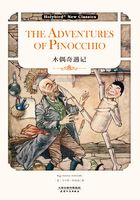
第7章
Geppetto returns home and gives his own breakfast to the Marionette
The poor Marionette, who was still half asleep, had not yet found out that his two feet were burned and gone. As soon as he heard his Father's voice, he jumped up from his seat to open the door, but, as he did so, he staggered and fell headlong to the floor.
In falling, he made as much noise as a sack of wood falling from the fifth story of a house.
"Open the door for me!" Geppetto shouted from the street.
"Father, dear Father, I can't," answered the Marionette in despair, crying and rolling on the floor.
"Why can't you?"
"Because someone has eaten my feet."
"And who has eaten them?"
"The cat," answered Pinocchio, seeing that little animal busily playing with some shavings in the corner of the room.
"Open! I say," repeated Geppetto, "or I'll give you a sound whipping when I get in."
"Father, believe me, I can't stand up. Oh, dear! Oh, dear! I shall have to walk on my knees all my life."
Geppetto, thinking that all these tears and cries were only other pranks of the Marionette, climbed up the side of the house and went in through the window.
At first he was very angry, but on seeing Pinocchio stretched out on the floor and really without feet, he felt very sad and sorrowful. Picking him up from the floor, he fondled and caressed him, talking to him while the tears ran down his cheeks:
"My little Pinocchio, my dear little Pinocchio! How did you burn your feet?"
"I don't know, Father, but believe me, the night has been a terrible one and I shall remember it as long as I live. The thunder was so noisy and the lightning so bright — and I was hungry. And then the Talking Cricket said to me, 'You deserve it; you were bad;' and I said to him, 'Careful, Cricket;' and he said to me, 'You are a Marionette and you have a wooden head;' and I threw the hammer at him and killed him. It was his own fault, for I didn't want to kill him. And I put the pan on the coals, but the Chick flew away and said, 'I'll see you again! Remember me to the family.' And my hunger grew, and I went out, and the old man with a nightcap looked out of the window and threw water on me, and I came home and put my feet on the stove to dry them because I was still hungry, and I fell asleep and now my feet are gone but my hunger isn't! Oh! — Oh! — Oh!" And poor Pinocchio began to scream and cry so loudly that he could be heard for miles around.
Geppetto, who had understood nothing of all that jumbled talk, except that the Marionette was hungry, felt sorry for him, and pulling three pears out of his pocket, offered them to him, saying:
"These three pears were for my breakfast, but I give them to you gladly. Eat them and stop weeping."
"If you want me to eat them, please peel them for me."
"Peel them?" asked Geppetto, very much surprised. "I should never have thought, dear boy of mine, that you were so dainty and fussy about your food. Bad, very bad! In this world, even as children, we must accustom ourselves to eat of everything, for we never know what life may hold in store for us!"
"You may be right," answered Pinocchio, "but I will not eat the pears if they are not peeled. I don't like them."
And good old Geppetto took out a knife, peeled the three pears, and put the skins in a row on the table.
Pinocchio ate one pear in a twinkling and started to throw the core away, but Geppetto held his arm.
"Oh, no, don't throw it away! Everything in this world may be of some use!"
"But the core I will not eat!" cried Pinocchio in an angry tone.
"Who knows?" repeated Geppetto calmly.
And later the three cores were placed on the table next to the skins.
Pinocchio had eaten the three pears, or rather devoured them. Then he yawned deeply, and wailed:
"I'm still hungry."
"But I have no more to give you."
"Really, nothing — nothing?"
"I have only these three cores and these skins."
"Very well, then," said Pinocchio, "if there is nothing else I'll eat them."
At first he made a wry face, but, one after another, the skins and the cores disappeared.
"Ah! Now I feel fine!" he said after eating the last one.
"You see," observed Geppetto, "that I was right when I told you that one must not be too fussy and too dainty about food. My dear, we never know what life may have in store for us!"